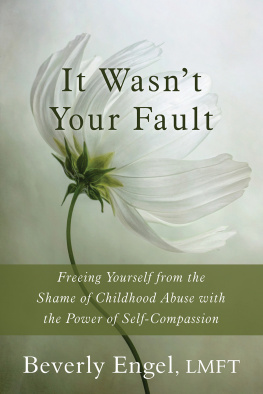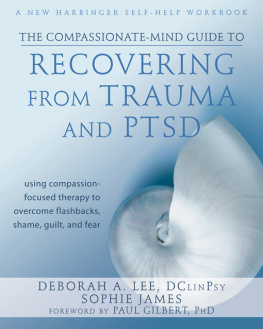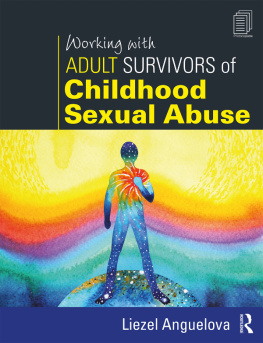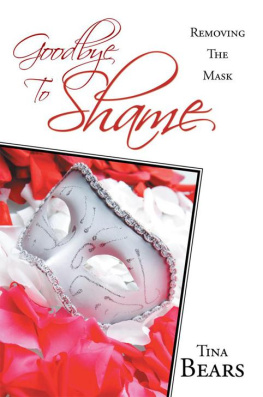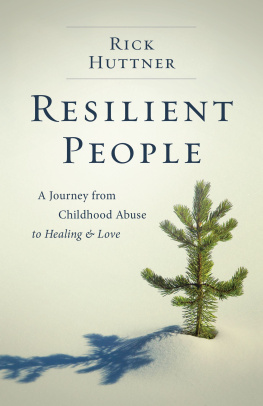
Beverly Engel, LMFT, is a licensed marriage and family therapist with over thirty years of experience working primarily with survivors of childhood and adult abuse. She is considered one of the worlds leading experts on emotional abuse recovery and is author of twenty nonfiction books on the subjects of emotional and sexual abuse recovery, relationship issues, and female empowerment. Her books include The Emotionally Abused Woman, The Emotionally Abusive Relationship, and Healing Your Emotional Self. She has appeared on many national television shows, including Oprah and Starting Over, has appeared on CNN, and was nominated for the Books for a Better Life Award for her powerful book, The Power of Apology.
With uncommon clarity and kindness, the author speaks directly to the invisible heart of childhood abuseshame. Readers will recognize the authentic voice of a former victim as she gently guides them on the healing path to self-compassion. It is an artful distillation of self-compassion theory, research, and practice for those who have suffered long enough. I cant recommend it highly enough.
Christopher Germer, PhD, clinical instructor at Harvard Medical School and author of The Mindful Path to Self-Compassion
This book provides an in-depth understanding of the many ways shame sustains the harm of past abuse, and outlines a powerful program for using self-compassion to free yourself from these bonds. Read it and heal.
Kristin Neff, PhD, author of Self-Compassion
In this beautifully written book, Beverley Engel offers us a scholarly, yet easily-accessible understanding of the nature of shame and the harm that it does us. She also articulates very clearly how compassion is one of the most important antidotes for shame. After all, its easy to be compassionate toward people we likebut real compassion is for when things get tough. No one can read this book without coming away with considerable insights into the problematic ways we often treat ourselves and the value of developing compassionnot just as an easy option, but as a courageous way to deal with our inner struggles. I cant recommend this book highly enough; it is well-researched, highly informative, and helpful. A real gift to those struggling with the inner conflicts of self-doubt and criticism.
Paul Gilbert, PhD, author of The Compassionate Mind
What a wonderful book! Beverly Engel has a deep understanding of how abuse and neglect affect children. Once again, she has written a much-needed, breakthrough book for those recovering from abuse. This time, she presents a profoundly powerful program to help survivors overcome one of the most devastating effects of abusedebilitating shame. In it she teaches survivors how to practice self-compassionan amazing healing tool. I highly recommend this book to anyone who was abused or neglected in childhood or adulthood.
Susan Forward, PhD, author of Toxic Parents and Mothers Who Cant Love

Publishers Note
This publication is designed to provide accurate and authoritative information in regard to the subject matter covered. It is sold with the understanding that the publisher is not engaged in rendering psychological, financial, legal, or other professional services. If expert assistance or counseling is needed, the services of a competent professional should be sought.
Distributed in Canada by Raincoast Books
Copyright 2015 by Beverly Engel
New Harbinger Publications, Inc.
5674 Shattuck Avenue
Oakland, CA 94609
http://www.newharbinger.com
Cover design by Amy Shoup
Acquired by Melissa Kirk
Edited by Clancy Drake
All Rights Reserved
Library of Congress Cataloging-in-Publication Data on file
I dedicate this book to all my clients, past and present, who inspire me, inform me, and heal me. Your strength, courage, and determination are awe-inspiring.
Contents
Acknowledgments
I am deeply grateful for the wise teachers, researchers, and authors who helped me to understand shame, compassion, and self-compassion on a much deeper level. First and foremost I wish to thank Gershen Kaufman for his brilliant work on shame, including his book Shame: The Power of Caring. No one understands the subject of shame quite as much as you seem to and I am so grateful I found your work. Next, I would like to thank those in the Restorative Justice movement who taught me that it is not through shaming that we rehabilitate offenders, but through compassion.
I am deeply indebted to Kristin Neff for her outstanding research on self-compassion, her excellent book Self-Compassion, and her website, http://www.selfcompassion.org, which not only helped me in the writing of this book but have helped many of my clients tremendously. I especially wish to thank Paul Gilbert, author of The Compassionate Mind and one of the leading researchers on self-compassion as a therapeutic tool, for his extensive research on compassion, especially as it relates to shame.
I also wish to thank Christopher Germer for his excellent book The Mindful Path to Self-Compassion, and Tara Brach for her revolutionary book Radical Acceptance, both excellent resources for myself and my clients. Last, but certainly not least, I wish to acknowledge the Dalai Lama, Mahatma Gandhi, Nelson Mandela, and Martin Luther King, Jr., all great men who taught us that it is through compassion that we will heal the world.
A special thank you to everyone at New Harbinger, and especially to freelance copy editor Clancy Drake, whose fine editing helped make the book the best it could be.
Introduction
Mine has been a life of much shame. I cant even guess what it must be to live the life of a human being.
Osamu Dazai
If you were a victim of childhood abuse or neglect you know about shame. You have likely been plagued by it all your life. You may feel shame because you blame yourself for the abuse itself (My father wouldnt have hit me if I had minded him), or because you felt such humiliation at having been abused (I feel like such a wimp for not defending myself). While those who were sexually abused tend to suffer from the most shame, those who suffered from physical, verbal, or emotional abuse blame themselves as well. In the case of child sexual abuse, no matter how many times you have heard the words Its not your fault, the chances are high that you still blame yourself in some wayfor being submissive, for not telling someone and having the abuse continue, for enticing the abuser with your behavior or dress, or because you felt some physical pleasure.
In the case of physical, verbal, and emotional abuse, you may blame yourself for not listening and thus making your parent or other caretaker so angry that he or she yelled at you or hit you. Children tend to blame the neglect and abuse they experience on themselves, in essence saying to themselves, My mother is treating me like this because Ive been bad, or, I am being neglected because I am unlovable. As an adult you may have continued this kind of rationalization, putting up with poor treatment by others because you believe you brought it on yourself. Conversely, when good things happen to you, you may actually become uncomfortable, because you feel so unworthy.
You may also have a great deal of shame due to the exposure of the abuse. If you reported the abuse to someone, you may blame yourself for the consequences of your outcryyour parents divorcing, your molester going to jail, your family going to court.

